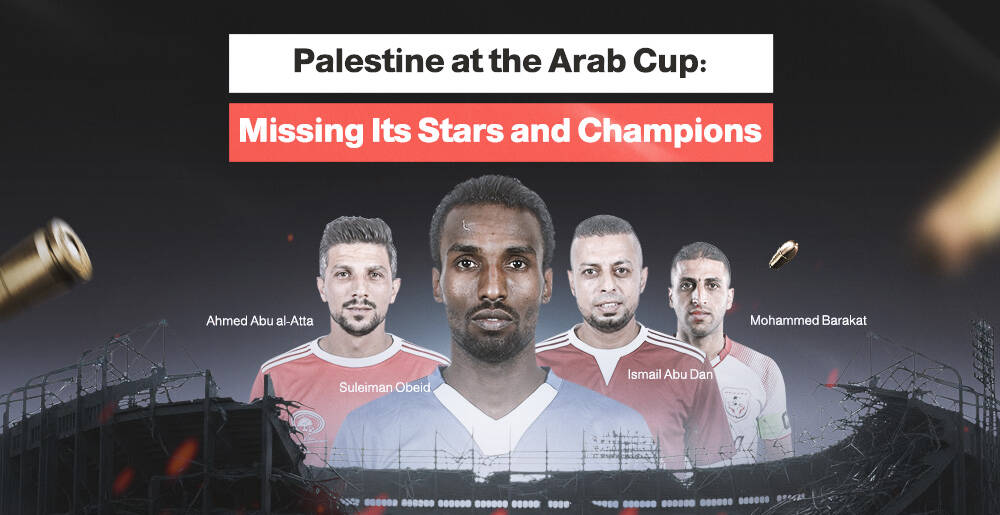Summit Canceled, Trip Confirmed: Why al-Sharaa Headed to Moscow Anyway
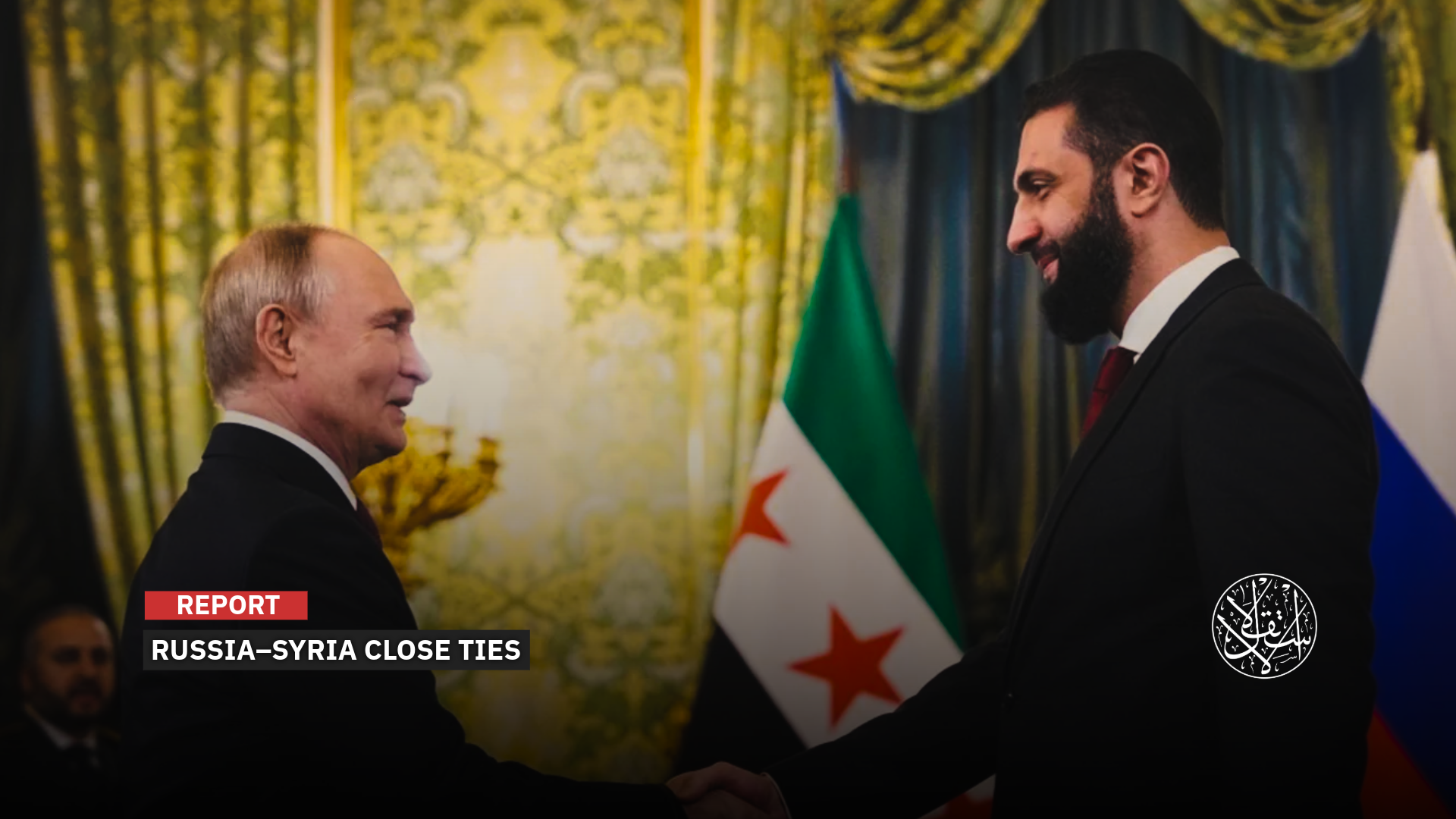
“States act according to their interests.”
Syrian President Ahmed al-Sharaa is accelerating Damascus’s efforts to redefine its relationship with Moscow, seeking to open a new chapter between the two countries based on shared interests rather than hostility.
On October 15, 2025, al-Sharaa arrived in Moscow and met with Russian President Vladimir Putin for the first time since the Kremlin’s former ally, the ousted head of the Syrian regime, Bashar al-Assad, was overthrown on December 8, 2024, and fled to Russia.
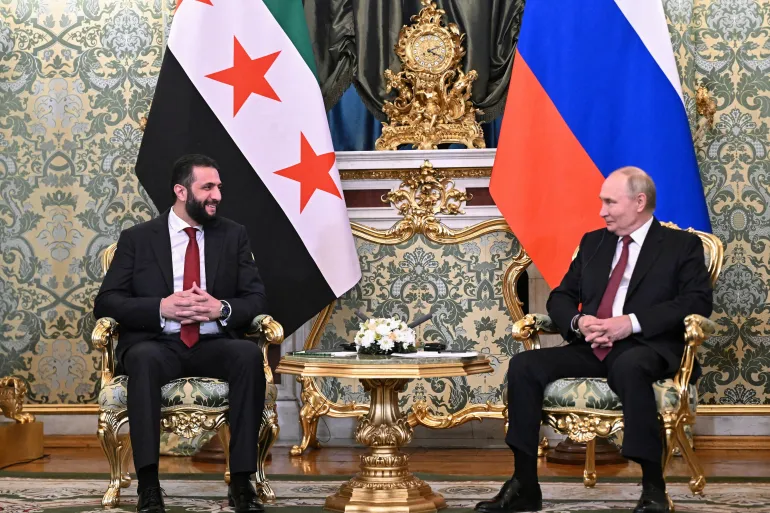
Al-Sharaa in Russia
Al-Sharaa is pushing ahead with Damascus’s effort to redefine its relationship with Moscow, opening a new chapter built on mutual interests rather than enmity.
Speaking before cameras alongside President Vladimir Putin in the Kremlin, al-Sharaa, who received a warm welcome, said Syria was seeking to rebuild and redefine the nature of this relationship in a way that ensures the independence of Syrian sovereignty as well as the safety, unity, and security stability of its territory.
He pointed to the “historic ties” and “shared interests” linking Syria and Russia, noting that Damascus “respects all agreements” with Moscow. The Syrian president added that part of Syria’s food supply depends on Russian production and that many of the country’s power plants rely on Russian expertise.
“We are trying to restore and redefine in a new way the nature of these relations so there is independence for Syria, sovereign Syria, and also its territorial unity and integrity and its security stability,” he said.
Putin, in turn, told al-Sharaa in remarks broadcast on Russian state television that over the decades, Moscow had been guided by the interests of the Syrian people.
“Throughout all these decades, we have always been guided by one thing: the interests of the Syrian people,” Putin said. “We truly have very deep ties with the Syrian people.”
The Russian leader said that more than four thousand Syrian students are currently studying in Russia and expressed hope they would contribute to Syria’s future. “We are very happy to see you,” Putin said. “Welcome.”
He noted that Russia and Syria have maintained diplomatic relations for more than eighty years, describing them as consistently friendly. “Russia has never linked its relationship with Syria to its own political circumstances or private interests,” he added.
Putin confirmed that the joint Russian-Syrian government committee, established in 1993, has resumed its work and thanked al-Sharaa for receiving a ministerial delegation headed by Deputy Prime Minister Alexander Novak. He said several promising initiatives were identified and that Russia was ready to help implement them, while both sides agreed through their foreign ministries to maintain regular consultations.
The Russian leader called the overthrowing of the Assad regime a “great success and a step toward societal consolidation” and said that Syria’s most recent parliamentary elections “will strengthen cooperation between all political forces” in the country, despite the “difficult times” it is facing.
Present at the meeting were Russian Foreign Minister Sergey Lavrov, Deputy Prime Minister Alexander Novak, and Kremlin foreign policy adviser Yuri Ushakov. The Syrian delegation included Foreign Minister Asaad Hassan al-Shaibani, Defense Minister Murhaf Abu Qasra, Intelligence Chief Hussein al-Salama, and Presidential Secretary General Maher al-Sharaa.
According to Russian media, the talks lasted more than two and a half hours. Moscow later said it was prepared to continue its role in producing Syrian crude oil. The state-run news agency TASS quoted Novak as saying that Russian companies have long operated in Syrian oil fields and that Russia is ready to participate in new ones.
Al-Sharaa’s visit came shortly after the Kremlin announced on October 9, 2025, that the first Russian-Arab summit, scheduled for mid-October, would be postponed. The summit, announced in April and months in preparation, was intended to showcase Moscow’s enduring influence in the Middle East despite Western sanctions.
Instead, the event turned into a diplomatic setback for Putin as attention shifted to Egypt’s Sharm el-Sheikh, which on October 13 hosted a summit on ending the Israeli war on Gaza attended by U.S. President Donald Trump and several Middle Eastern and European leaders, with Russia conspicuously absent.
Analysts say Damascus is eager to accelerate the redefinition of its ties with Moscow after a decade in which Russia deeply penetrated Syrian sovereignty, exploiting Bashar al-Assad’s dependence on the Kremlin to crush the uprising.
Following the Syrian revolution’s victory and Assad’s flight to Moscow, where he and his family were granted humanitarian asylum, relations between the two countries remained suspended despite shared interests.
Moscow quickly opened channels with Syria’s new leadership. On January 29, 2025, al-Sharaa met in Damascus with a Russian delegation led by Deputy Foreign Minister Mikhail Bogdanov, marking the first Russian visit since Assad’s fall.
Al-Sharaa also held a phone conversation with Putin on February 12, 2025, their first direct contact since Assad’s ouster. The Kremlin said at the time that Putin wished al-Sharaa success in facing the challenges before Syria’s new leadership, emphasizing the “historic friendship and mutually beneficial cooperation” between the two peoples.
A major diplomatic shift came on July 31, 2025, when Syrian Foreign Minister Asaad al-Shaibani visited Moscow for talks with Lavrov and Putin.
Al-Sharaa later sent a political message to Moscow in a September 12 interview with Syrian state television, revealing that negotiations had taken place with Russia after revolutionary forces entered Hama during Operation Deterrence of Aggression aimed at toppling Assad.
According to the Syrian president, that advance prompted Moscow’s military withdrawal from the battlefield as opposition factions reached Homs under a mutual agreement between the two sides. “The Russians made certain commitments to the current Syrian state, and we made ours. We have kept our promises, and they have kept theirs so far,” he said.
He added that communication and the reopening of relations with Moscow began after revolutionary forces took control of Aleppo on November 29, 2024.
Observers saw al-Sharaa’s remarks as an attempt to ease public anger toward Russia, whose forces were complicit in the bloodshed of Syrians, while paving the way for potential military and economic understandings that could serve the interests of both nations.
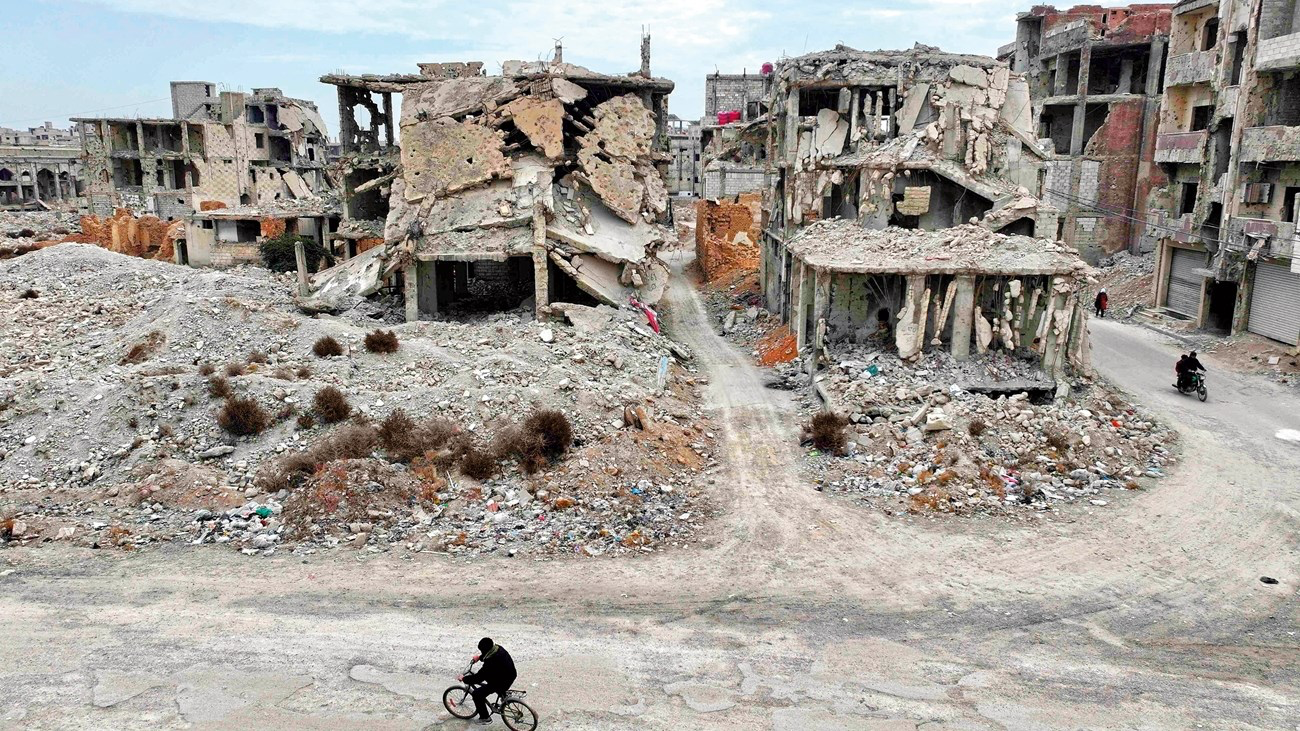
Not a Question of Forgiveness
In this context, Syrian security researcher Nawar Shaban of the Harmoon Center for Contemporary Studies said that President al-Sharaa’s visit to Moscow does not mean forgiving Russia for the crimes it committed in Syria during Bashar al-Assad’s rule.
“What is happening now is a redefinition of the relationship between the two countries in a way that ensures and preserves Syrian sovereignty,” he told Al-Estiklal.
“Redefining the relationship must also include a Russian acknowledgment of the crimes it committed in Syria, either directly or through its support for the former Assad regime, ultimately leading to compensation for the Syrian people.”
Shaban noted that Damascus is interested in discussing with Moscow issues related to food, electricity, and fuel supplies that Russia used to provide to the former Assad regime, as well as whether such assistance will continue, expand, or evolve into broader energy cooperation.
He said Russia’s military presence in Syria is now a central issue in discussions between Damascus and Moscow, first raised during Foreign Minister Asaad al-Shaibani’s visit to Moscow in August 2025, which laid the groundwork for al-Sharaa’s visit.
On the question of whether Russia might hand over Bashar al-Assad, who remains in exile there, Shaban said that Moscow has never extradited any leader it has granted protection to, as doing so would harm its prestige.
He described al-Sharaa’s visit as part of “a new Syrian approach aimed at resetting enmities and opening up to the world in a way that safeguards its sovereignty.”
Syria, the researcher added, still has many demands from Russia—among them the recovery of billions of dollars smuggled to Moscow by the Assad family over the years.
Some analysts believe that setting aside hostility could benefit both countries. Syria, now entering a phase of state-building and economic recovery, needs positive relations with permanent members of the UN Security Council, including Russia.
Retired Brigadier General Abdullah al-Asaad, head of the Syrian Rasd Center for Strategic Studies, told Al-Estiklal that President Ahmed al-Sharaa’s visit was not a surprise, since channels of communication between the new leadership and Moscow began after Assad’s fall and even during Operation Deterrence of Aggression.
He said coordination between Moscow and the new government in Damascus has never ceased, given that Syria’s military arsenal has long been dominated by Russian weapons and that many key sectors, especially energy and food, remain tied to Russian influence.
Resuming Russia’s traditional supplies of arms, fuel, and wheat, al-Asaad noted, could prove a lifeline for the country of 23 million people, where 80 percent of the population now lives in poverty.
Although Russia supported Bashar al-Assad in suppressing the revolution and waging war on the Syrian people, al-Asaad said, “States act according to their interests.”
For that reason, he explained, Damascus’s outreach to Moscow stems from pragmatic state interests and carries with it deep, strategic files crucial to stabilizing Syria’s new political order.
He added that the discussions also concern re-arming the Syrian military and securing Russian support at the UN Security Council, where Moscow’s permanent-member status can be decisive in shaping resolutions related to Syria, particularly those requiring approval without the use of a veto.
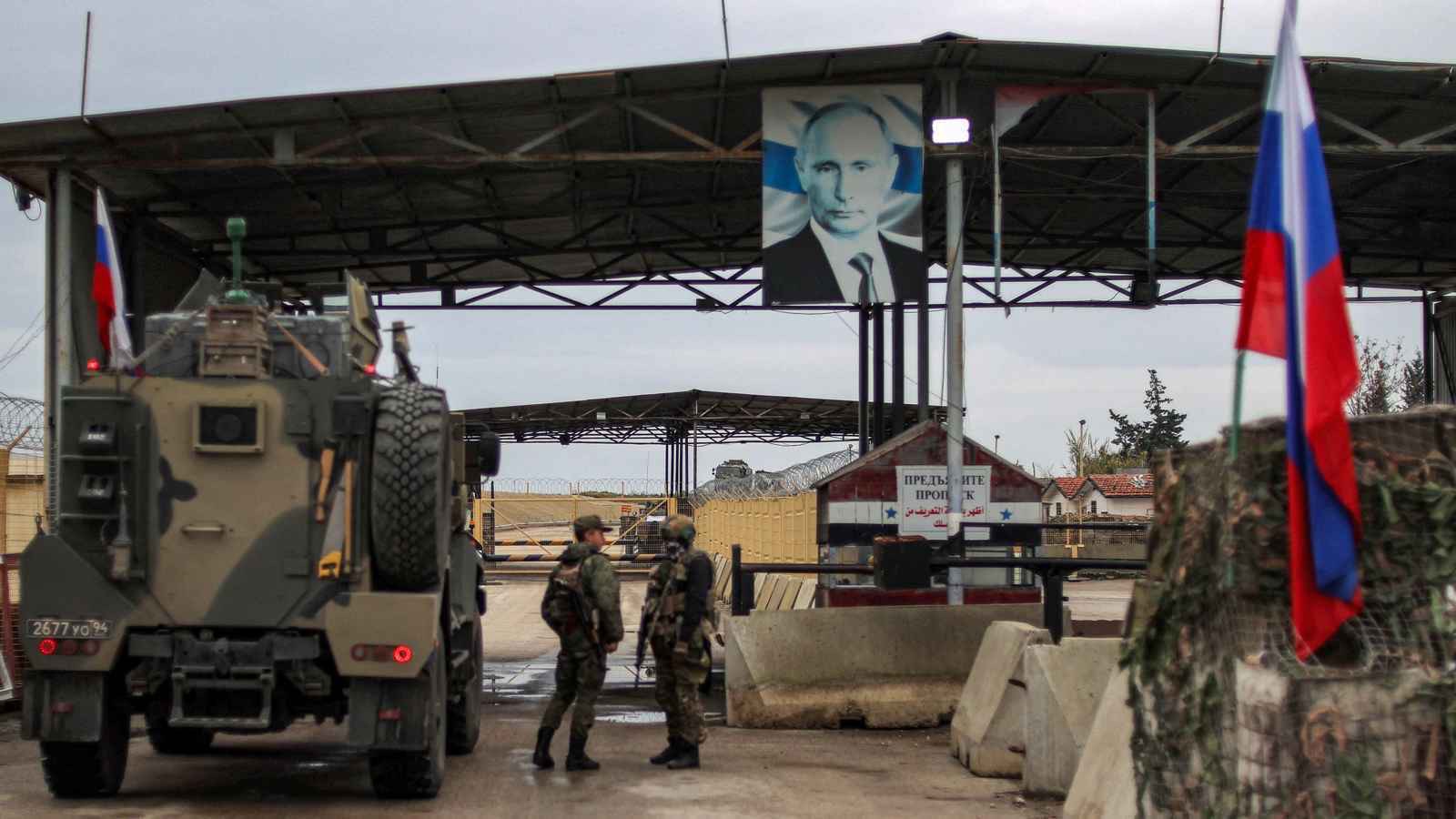
A Preemptive Move
Russia may also be in a position to pressure the Israeli Occupation, which withdrew from the 1974 Agreement on Disengagement with Syria the day after Assad’s fall, to halt repeated violations that threaten the country’s stability and territorial integrity.
Since the collapse of the Assad regime, Israeli Occupation forces have carried out near-daily ground incursions into Syrian territory and conducted frequent airstrikes that have often resulted in material damage and casualties.
“Israel” has also supported separatist tendencies in southern Syria, particularly in the Druze-majority province of Sweida.
Some analysts suggest that the deployment of Russian peacekeeping forces in the Golan Heights—a proposal first made by Vladimir Putin in 2013—could now be among Damascus’s options to revive Moscow’s role amid “Israel’s” ongoing aggression, especially given the strong relationship between Russia and the Israeli Occupation.
Journalist and political commentator Darwish Khalifa noted that the cancellation of the Russian-Arab summit, which was scheduled to be held in Moscow in mid-October 2025 with Syria’s participation, prompted President al-Sharaa to move independently toward the Kremlin.
In a post on his Facebook account, Khalifa said al-Sharaa’s request for a bilateral meeting with Vladimir Putin was not a mere protocol gesture but rather a preemptive attempt to control the direction of events inside Syria, particularly in the south, where the interests of “Israel,” Russia, Turkiye, and the United States intersect.
He added that for Tel Aviv, Russia’s presence in southern Syria following the decline of Iranian influence serves as a stabilizing counterweight to Turkiye’s growing footprint in the north.
It also allows the Israeli Occupation to avoid American pressure to withdraw its forces from the buffer zone it reexpanded last spring.
Khalifa said that Putin, for his part, now faces a rare opportunity to compensate for the loss of his strongest ally in the Middle East after the fall of the Assad regime.
Regaining influence in Syria, he explained, would secure for Moscow a direct foothold on the Mediterranean and regional leverage it cannot afford to relinquish at this moment.
Khalifa added that President al-Sharaa is not entering Moscow as a victor; Syria’s internal fragility compels him to present himself as a partner seeking to stabilize the country rather than impose conditions.
He understands, Khalifa said, that if Russia refrains from playing a peacekeeping role in southern Syria, the Israeli Occupation will likely pursue alternative scenarios—foremost among them the establishment of a self-rule arrangement in Sweida. Such a development, he warned, would deepen internal fragmentation, while Israeli Prime Minister Benjamin Netanyahu views Syria’s weakness as a strategic advantage.
“The core message is that southern Syria has become the gateway for reshaping international and regional influence. Any Russian absence there will be filled by Israel, in a way that serves its security interests, not Syria’s unity,” Khalifa concluded.
Sources
- Al-Sharaa Meets Putin, Stresses Syria’s Intention to Redefine Ties with Moscow [Arabic]
- Al-Sharaa Affirms Respect for Agreements with Russia as Putin Highlights 80 Years of Strong Ties with Syria [Arabic]
- Ahmed al-Sharaa: Israel Was “Surprised” by Assad’s Fall, and We Negotiated with Russia During Operation Deterrence of Aggression [Arabic]
- Postponement of the Russian-Arab Summit in Moscow Highlights Decline of Russia’s Role in the Middle East [Arabic]
- Syria’s interim president visits Putin in Moscow for first meeting since fall of Assad regime
- Syrian president promises to 'redefine' relations with Russia in historic meeting with Putin










